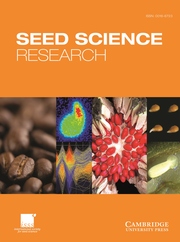Article contents
The longevity of desorbing and adsorbing rice seeds
Published online by Cambridge University Press: 05 December 2016
Abstract
In each of two experiments, freshly harvested seeds of two cultivars of rice were dried and then rehydrated to different moisture levels. In experiment 1, seed equilibrium relative humidity (eRH) and moisture content (MC) were determined at each moisture level so that moisture desorption and adsorption isotherms could be constructed. Seed storage experiments were also carried out for seeds equilibrated at each moisture level, in sealed aluminium foil packets at 45°C. In experiment 2, storage experiments at 45°C were carried out on seeds dried to 12% MC and seeds dried to lower moisture levels and then rehydrated to 12% MC.
The moisture adsorption isotherm was shifted to lower MC at a given eRH compared with the desorption isotherm. This hysteresis effect was seen both when seeds were dried to <6% MC and then allowed to adsorb moisture to different levels, and when seeds were dried to different levels (10, 8, 6 or 4% MC) and then allowed to adsorb moisture up to 12% MC. The log-log relationship between seed longevity, σ [the standard deviation of the normal distribution of seed deaths over time, as defined in the Ellis and Roberts (1980) seed viability equations] and seed storage MC did not vary depending on whether the seeds were desorbing or adsorbing moisture. The relationship between σ and eRH was better described by a log-log model than a log-linear model and did vary depending on whether seeds were desorbing or adsorbing moisture: at a given eRH, the longevity of adsorbing seeds was greater than that of desorbing seeds. The implications for seed storage are discussed.
Information
- Type
- Research Papers
- Information
- Copyright
- Copyright © Cambridge University Press 2016
References
- 7
- Cited by


